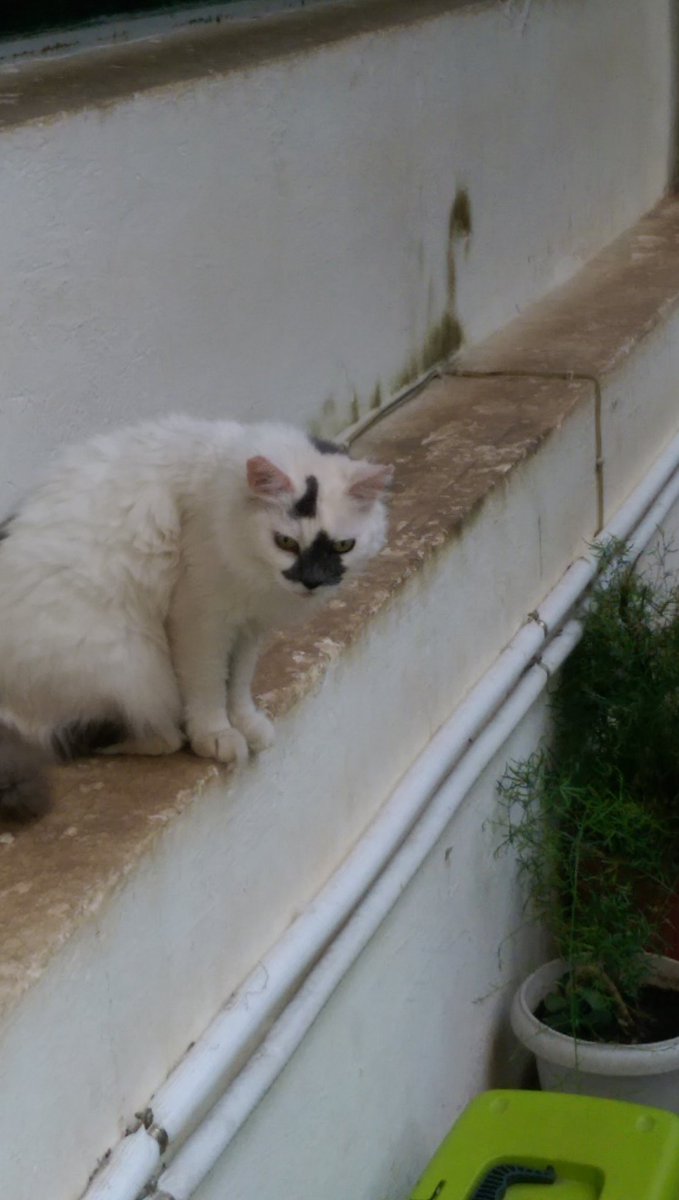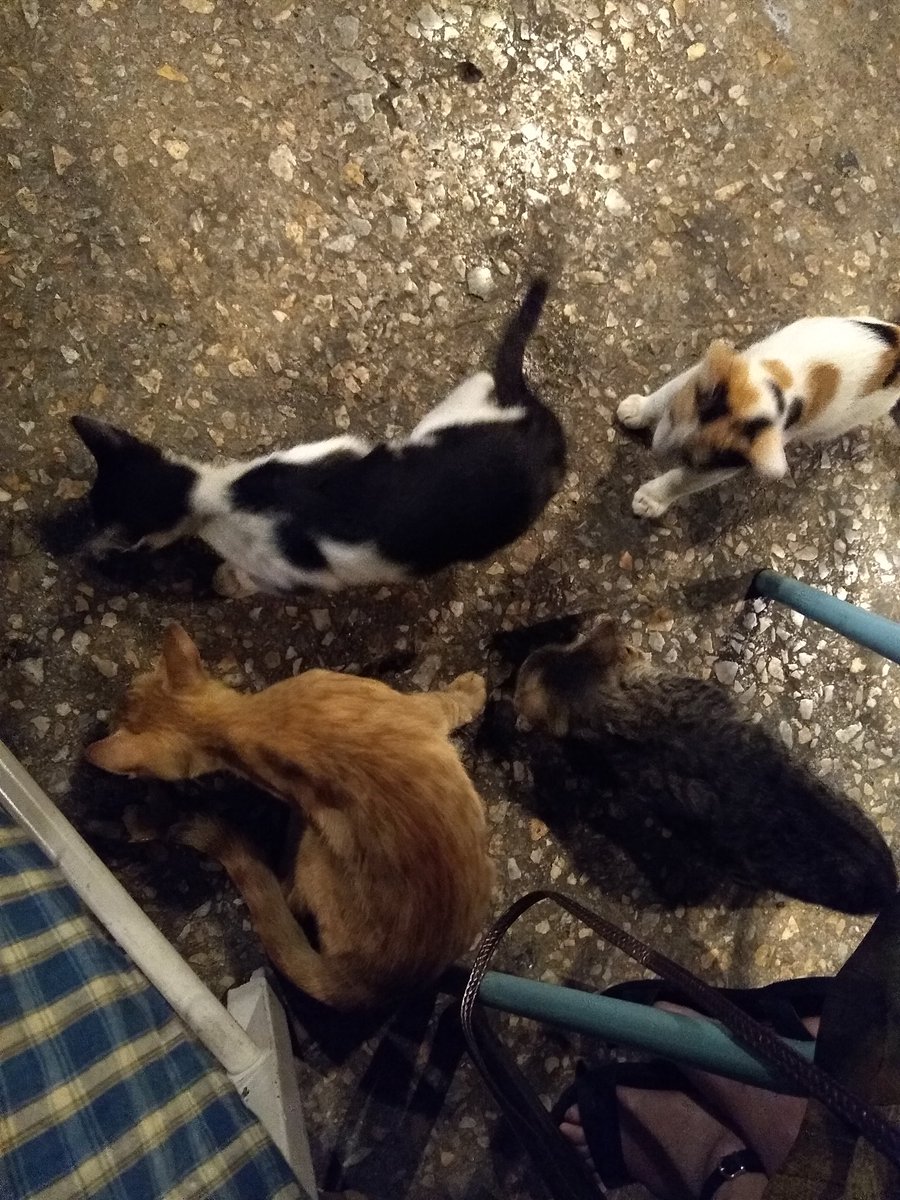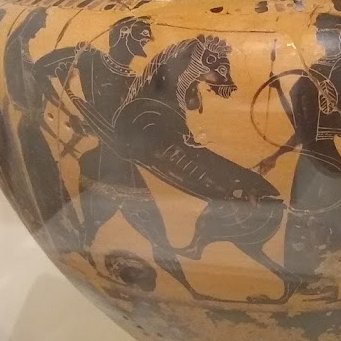
This #archaeology thread gives a behind-the-scenes look at the new @discovery show “Hunting Atlantis” hosted by @stelpavlou & @jessphoenix2018
I present findings based on years of interdisciplinary research into the archaeological and historical context around Atlantis
/1
I present findings based on years of interdisciplinary research into the archaeological and historical context around Atlantis
/1
The secrets presented in this thread will anger a large swath of people
They’ve already begun trolling me and other scholars in my cabal after we first spoke up about #Atlantis
BUT I WILL NOT BE SILENCED
the truth will prevail
/2
They’ve already begun trolling me and other scholars in my cabal after we first spoke up about #Atlantis
BUT I WILL NOT BE SILENCED
the truth will prevail
/2
We all know the story of Atlantis. It’s been popularized, retold, and adapted in movies, on TV, and in comic books
But the true history is still shocking. It’s tinged by violence and hatred and is part of our own 21st century phenomenon of rampant conspiracy theories
/3
But the true history is still shocking. It’s tinged by violence and hatred and is part of our own 21st century phenomenon of rampant conspiracy theories
/3
As a Classical archaeologist, I have handled contemporary archaeological evidence from Athens and nearby sites. I have read Plato in his original Greek
My goal is to expose the primary archaeological & textual sources that reveal Atlantis and show how its misuse harms us
/4
My goal is to expose the primary archaeological & textual sources that reveal Atlantis and show how its misuse harms us
/4

At its core, the story of Atlantis is simple
In the mythical past, the island state of Atlantis faced Athens in war. But the immorality of the Atlantides angered Zeus who destroyed it in earthquakes & floods
As we dig in, you’ll see it’s more shadowy than Plato’s famous Cave
/5
In the mythical past, the island state of Atlantis faced Athens in war. But the immorality of the Atlantides angered Zeus who destroyed it in earthquakes & floods
As we dig in, you’ll see it’s more shadowy than Plato’s famous Cave
/5
For hundreds of years, humans have been hunting for the mythical, lost city of #Atlantis. Why? Because we like to find what is lost
Side note: Have you ever noticed when you lose something (your keys?) that they’re always in the last place you look? How strange!
/6
Side note: Have you ever noticed when you lose something (your keys?) that they’re always in the last place you look? How strange!
/6
The premise behind @discovery’s “Hunting Atlantis” is a new theory presented in an unpublished paper by the host @stelpavlou
Stel shared his paper with me, so I can give a scholarly critique of its evidence & conclusions. He summarizes them below:
/7



Stel shared his paper with me, so I can give a scholarly critique of its evidence & conclusions. He summarizes them below:
/7




The provocative claim at the center of Stel’s paper and TV show is that we have dated the myth of Atlantis wrong
In Plato, the character Critias claimed it happened 9000 years before him (ca. 9300 BCE); Stel claims to redate this story to around 5000 BCE
/8
In Plato, the character Critias claimed it happened 9000 years before him (ca. 9300 BCE); Stel claims to redate this story to around 5000 BCE
/8

Having read the paper carefully, I can see how cleverly it has been researched. The citations and footnotes are, for the most part, accurate
However, the paper (and the fact it’s turned into what will be a popular TV show) reveals the dangers of losing trust in experts
/9
However, the paper (and the fact it’s turned into what will be a popular TV show) reveals the dangers of losing trust in experts
/9
Contrary to popular belief, conspiracy theorists do real research. They look at real evidence & find patterns in the evidence (Pyramids! Circular walls! Etc.)
However, their distrust in experts means they dismiss the larger context of the evidence they are cherry-picking
/10
However, their distrust in experts means they dismiss the larger context of the evidence they are cherry-picking
/10
While the footnotes & citations in Stel’s paper are fairly accurate, the statements lacking citation are completely ungrounded from evidence
It’s a good example of research conducted with a goal to prove a theory rather than from an unbiased perspective (intentional or not)
/11
It’s a good example of research conducted with a goal to prove a theory rather than from an unbiased perspective (intentional or not)
/11
There are a whole range of examples I could give, so I’ll focus on three mistakes made by Stel and other Atlantis truthers:
1) the evidence for Atlantis as a circular settlement
2) the removal of Athens from the Atlantis story
3) a poor reading of our primary sources
/12
1) the evidence for Atlantis as a circular settlement
2) the removal of Athens from the Atlantis story
3) a poor reading of our primary sources
/12
In Plato’s Timaeus and Critias, the character Critias describes the city of #Atlantis as having a series of circular walls and moats
This description has informed the canonical modern reconstructions of what Atlantis could have looked like
/13
(translation by Waterfield 2008)

This description has informed the canonical modern reconstructions of what Atlantis could have looked like
/13
(translation by Waterfield 2008)


But, we want more than a fanciful reconstruction. We want the real thing, just as Socrates says at the beginning of Plato’s Timaeus he doesn’t just want to see a painting (γραφῆς εἰργασμένα) of beautiful animals (ζῷα καλά), he wants to see them in motion (κινούμενά)!
/14
/14
And so, Stel – like so many Atlantis truthers before him – has searched archaeological publications for settlements arranged in a circular fashion walls and/or ditches
And, no surprise, he found a bunch of them!
/15

And, no surprise, he found a bunch of them!
/15


He uses this map of circular ditched and fortified enclosures to demonstrate their commonness in Neolithic Europe as support for his new date of 5000 BCE
This is real evidence. It seems to match!
/16
This is real evidence. It seems to match!
/16
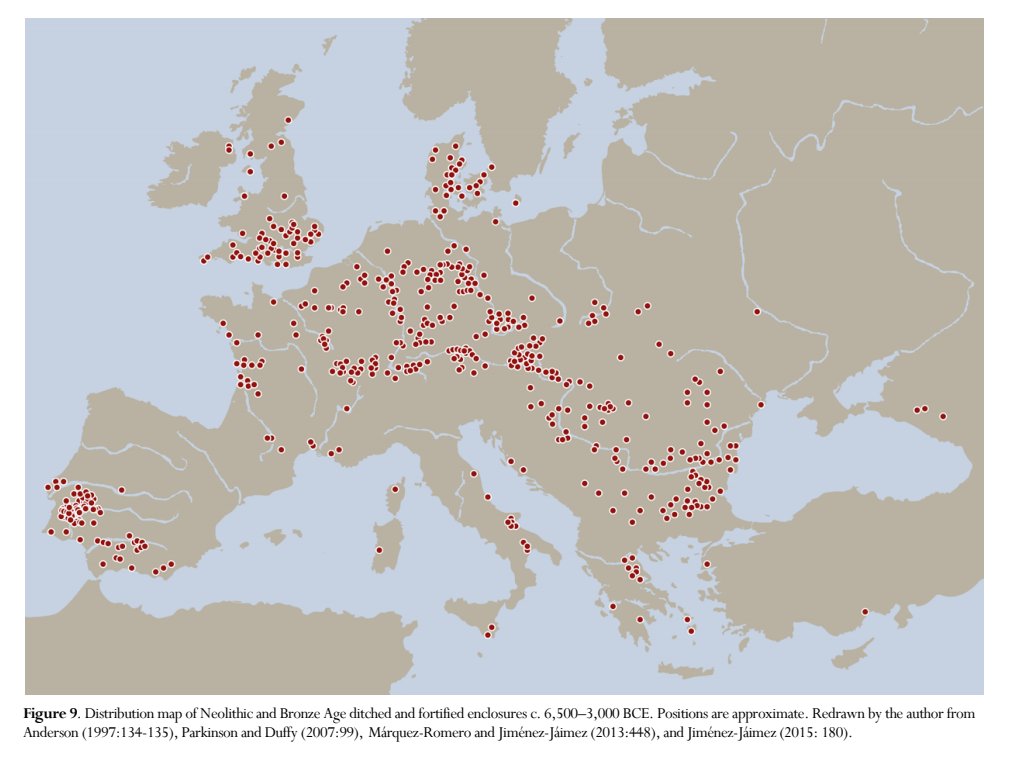
But the chronological proof that his circular hypothesis rests on is uncited:
“It is a peculiar description for a city; entirely unknown in Plato’s time when urban planning across the known world had long settled on grid systems from at least 2,500 BCE onwards”
/17
“It is a peculiar description for a city; entirely unknown in Plato’s time when urban planning across the known world had long settled on grid systems from at least 2,500 BCE onwards”
/17

This statement is false. Grid systems were not unilaterally adopted in 2,500 BCE
Circular (often fortified and ditched) settlements existed after 2,500 BCE, at Plato’s time, and even later
/18



Circular (often fortified and ditched) settlements existed after 2,500 BCE, at Plato’s time, and even later
/18

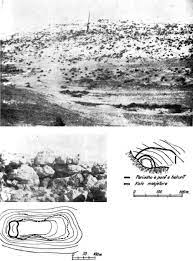


People all over the world and in many historical prehistoric periods arranged settlements in a circular fashion, especially when the topography is roughly circular (like on a hill)
Just because things are similar doesn’t mean there are connections between them
/19
Just because things are similar doesn’t mean there are connections between them
/19

Conspiracy theories work because they present real evidence, if cherry-picked. The only way to pick them apart is to examine the larger context the evidence comes from
And when it comes to the story of Atlantis, we shouldn't forget the second city in the story: Athens
/20
And when it comes to the story of Atlantis, we shouldn't forget the second city in the story: Athens
/20
If we want to make the argument that Atlantis, as described by Plato’s character Critias, is based in reality, then we also need to demonstrate that his description of Athens is also real
After all, the context of the Atlantis story is a comparison of Athens and Atlantis
/21
After all, the context of the Atlantis story is a comparison of Athens and Atlantis
/21

This is where Atlantis truthers don’t want you to look!
They focus on Critias’s description of Atlantis and never consider his parallel description of Athens
Why? Because even though Plato is from Athens, the description of Athens doesn’t match our archaeological evidence
/22
They focus on Critias’s description of Atlantis and never consider his parallel description of Athens
Why? Because even though Plato is from Athens, the description of Athens doesn’t match our archaeological evidence
/22
Even if Atlantis dated to 5000 BCE, it’s pretty clear that Critias’s Athens simply cannot
Despite extensive excavations over last 200 yrs, the sum of our evidence for human occupation around 5000 BCE is a handful of wells filled with rubbish & a fragmentary marble figurine
/23



Despite extensive excavations over last 200 yrs, the sum of our evidence for human occupation around 5000 BCE is a handful of wells filled with rubbish & a fragmentary marble figurine
/23
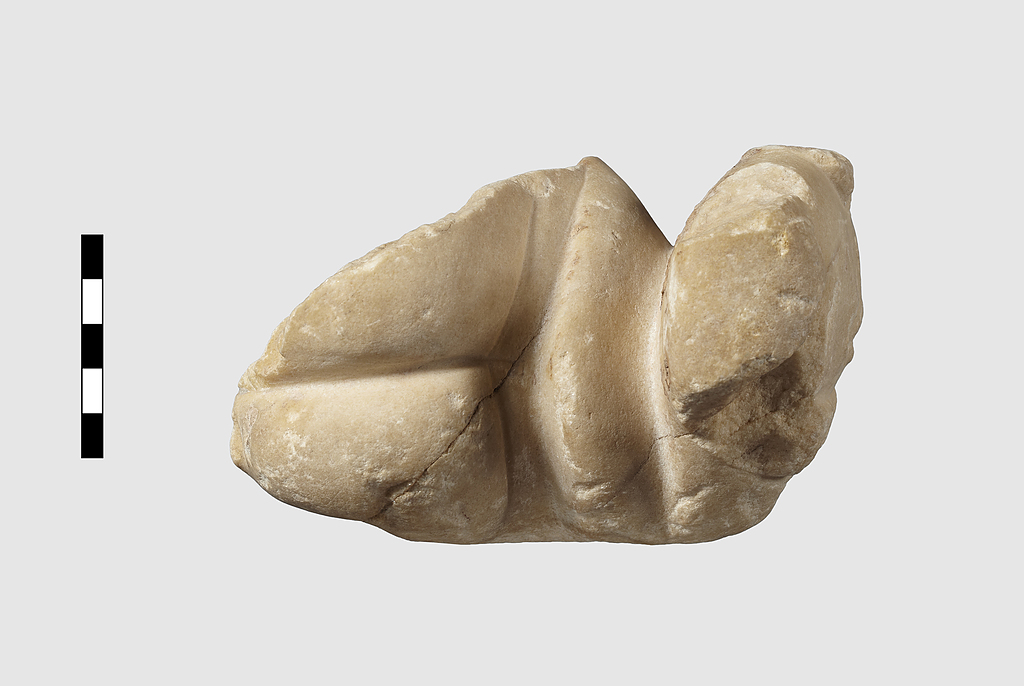



That’s it. Archaeological description from Hurwit 1999 below
This was no great city as described by Critias. There was no large population that ruled over a legendary empire & commanded a large army to stop the invasion of the Atlantides
It was a tiny village
/24



This was no great city as described by Critias. There was no large population that ruled over a legendary empire & commanded a large army to stop the invasion of the Atlantides
It was a tiny village
/24

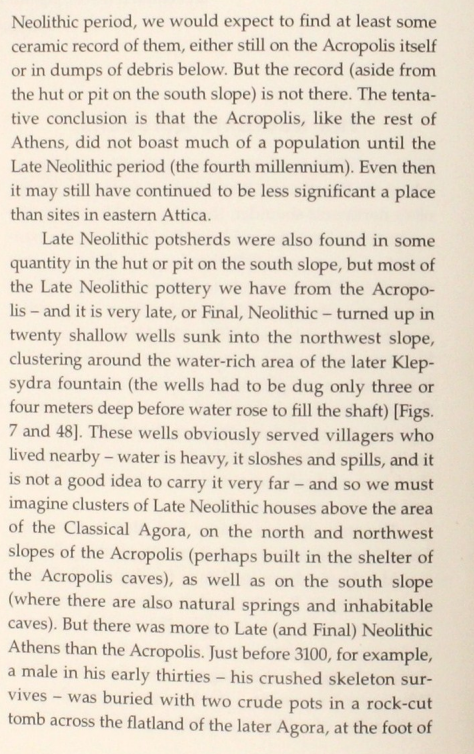


If you look closely at Critias’s description (Waterfield 2008) of architecture in early Athens, we can tell it is an accumulation of structures, neighborhoods & monuments constructed across centuries (e.g., Acropolis wall, ca. 1300 BCE; Athena temple ca. 600 BCE, etc.)
/25
/25

Furthermore, a big part of the Atlantis story focuses on geomythology. Finding evidence for a geological disaster that matches Critias’s description of the destruction of Atlantis
Presumably, that’s why @discovery’s Hunting Atlantis includes @jessphoenix2018 as a co-host
/26
Presumably, that’s why @discovery’s Hunting Atlantis includes @jessphoenix2018 as a co-host
/26
But, again, those who study Atlantis focus only on Atlantis and ignore Critias’s description of the geological change in Athens. There are plentiful descriptions like that of the Acropolis below (transl. Waterfield 2008)
/27
/27

This description of the Athenian Acropolis shrinking over time due to geological processes, are easily shown to be false
The Acropolis is a bedrock outcrop, and archaeological wells around it give a sense of ground level in different periods. It hasn’t shrunk!
/27
The Acropolis is a bedrock outcrop, and archaeological wells around it give a sense of ground level in different periods. It hasn’t shrunk!
/27

Plato is an Athenian. The story is set in Athens
So, why, if the archaeology and geology of Athens in these dialogs are categorically false, why then do we expect to find geological and archaeological truth in the parallel description of Atlantis?
/28
So, why, if the archaeology and geology of Athens in these dialogs are categorically false, why then do we expect to find geological and archaeological truth in the parallel description of Atlantis?
/28
We shouldn’t
The setting, characterization, and narrative of the two Platonic dialogs (Timeaus & Critias) repeatedly emphasize the #Atlantis story is not a true history
Though, Plato does this sarcastically, which trips up people who don’t read the whole thing
/29
The setting, characterization, and narrative of the two Platonic dialogs (Timeaus & Critias) repeatedly emphasize the #Atlantis story is not a true history
Though, Plato does this sarcastically, which trips up people who don’t read the whole thing
/29
This is the biggest evidence-based problem with every modern theory about #Atlantis. Our only clues exist in Plato
We can’t just pull random quotes out, unless we understand them in their own context: the one presented by the Platonic dialogs
/30
We can’t just pull random quotes out, unless we understand them in their own context: the one presented by the Platonic dialogs
/30
The setting of Timaeus and Critias is, like other Platonic dialogs, a conversation between Socrates and a few interlocutors. Here, these interlocutors are Timaeus, Critias, and Hermocrates
These are philosophical texts (surprising!), not ancient history texts
/31
These are philosophical texts (surprising!), not ancient history texts
/31
This conversation is set in Athens, taking place a day after the conversation that formed Plato’s Republic
There, Socrates presented a model for an ideal city. As Mark Usher (2020, p. 98-99) recently suggested, this is a simulation, a philosophical version of SimCity
/32
There, Socrates presented a model for an ideal city. As Mark Usher (2020, p. 98-99) recently suggested, this is a simulation, a philosophical version of SimCity
/32

In the Timaeus and Critias conversation a day later, Socrates now challenges his interlocutors to build upon this earlier model. He doesn’t want a painting of an animal at rest, he wants to see it in motion. He wants to see how his ideal city would perform in war
/33

/33


That is the setting for this story of early Athens (the ideal city) vs. Atlantis
The interlocutors play with this premise throughout these dialogs. Poking fun at the “true history” ( they are creating in this discussion
/34

The interlocutors play with this premise throughout these dialogs. Poking fun at the “true history” ( they are creating in this discussion
/34


As described by Johansen 1998 (histos.org/documents/1998…),
The plan of this story is to transfer the citizen groups devised in The Republic (guardians, philosopher-kings, and all) into a mythical version of early Athens
The whole story is a philosophical exercise!
/35
The plan of this story is to transfer the citizen groups devised in The Republic (guardians, philosopher-kings, and all) into a mythical version of early Athens
The whole story is a philosophical exercise!
/35
But, just like Plato’s Cave, there are shadows set up to confuse us
Critias, after all, simultaneously admits the story is a fictional adaptation and that it is a fully true story about early Athens, written down in Egypt, and passed to his family from Solon
/36
Critias, after all, simultaneously admits the story is a fictional adaptation and that it is a fully true story about early Athens, written down in Egypt, and passed to his family from Solon
/36

Why do this? Well, Plato likes to do this. For example, this conversation, despite seeming plausible, could never have happened with these characters (Hermocrates was a Sicilian statesman responsible for defeating the Athenians and their Sicilian Expedition)
/37
/37
Just like many of the stories in Plato’s dialogs, such as Aristophanes describing ancient humans with four legs and four arms, they are presented in a tongue-in-cheek manner
Historical references are twisted to make those shadows on the wall
/38
Historical references are twisted to make those shadows on the wall
/38

And despite, Critias’ claim that the story is true, immediately before telling the full version of the #Atlantis story he begs for leniency on its truthfulness
The story is meant as another simulation, perhaps this time more along the lines of Sid Meier’s Civilization
/39


The story is meant as another simulation, perhaps this time more along the lines of Sid Meier’s Civilization
/39

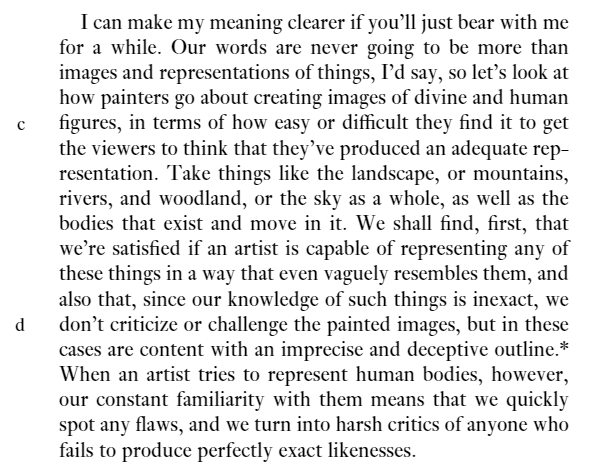

Two great cities are manifested from our imagination. An age is spent creating different forms of government, two different landscapes, two different cultures
Now, what happens if they fight?
/40
Now, what happens if they fight?
/40

That’s the premise for the #Atlantis story
This is the evidence we have. If you don’t believe me, you can find an open access translation of Plato’s Republic, Timaeus, and Critias on Perseus: perseus.tufts.edu/hopper/collect…
/41
This is the evidence we have. If you don’t believe me, you can find an open access translation of Plato’s Republic, Timaeus, and Critias on Perseus: perseus.tufts.edu/hopper/collect…
/41
Go read about Neolithic and Bronze Age Athens in The Athenian Agora 13 by Sara Immerwahr.
@ASCSAthens makes it available for free here: ascsa.edu.gr/uploads/media/…
/42
@ASCSAthens makes it available for free here: ascsa.edu.gr/uploads/media/…
/42
None of our archaeological or textual sources are hidden
Archaeologists work hard to make our evidence transparent for the public. You can search the Agora database for all the Neolithic evidence from Athens: agora.ascsa.net/research?v=lis…
/43
Archaeologists work hard to make our evidence transparent for the public. You can search the Agora database for all the Neolithic evidence from Athens: agora.ascsa.net/research?v=lis…
/43
And, I know this thread is f@cking long at this point. But, indulge me for a moment.
It’s important to understand why TV show about fake archaeology and fake history are damaging to our world
/44
It’s important to understand why TV show about fake archaeology and fake history are damaging to our world
/44
There are three reasons why conspiracy theories like #Atlantis harm our world:
1) they take away attention from real archaeological and historical research
2) they promote misinformation and distrust in real scholars
3) they are wrapped up with racist, violent ideology
/45
1) they take away attention from real archaeological and historical research
2) they promote misinformation and distrust in real scholars
3) they are wrapped up with racist, violent ideology
/45
There is fantastic archaeological research about Neolithic world. Stories about domestication, religious ritual, warfare, human ingenuity, and everyday life
For a project I’m involved in, check out the site of Gourimadi, on the island of Evia:
/46
For a project I’m involved in, check out the site of Gourimadi, on the island of Evia:
https://twitter.com/FlintDibble/status/1289221859263700994
/46
I love to share my research with the public. And when I do have an audience, they like the stories I tell (e.g., my webinar on animal bones: vimeo.com/421583130)
The same is true for many other archaeologists. We have great, evidence based stories that will shock you!
The same is true for many other archaeologists. We have great, evidence based stories that will shock you!
But apparently TV execs prefer #Atlantis and #AncientAliens
Well, fuck you @discovery and @history
How do you think our society is so screwed up? Because this kind of shit grabs attention and therefore rises to the top
/48
Well, fuck you @discovery and @history
How do you think our society is so screwed up? Because this kind of shit grabs attention and therefore rises to the top
/48
It’s because of these sorts of programming decisions (and algorithms on content sites), entirely based on money, that we are seeing a major rise in misinformation and a distrust of experts in our 21st century world
This problem affects us all
/49
This problem affects us all
/49
https://twitter.com/DSAArchaeology/status/1128810997710508032
The rise of Q A-non and other similarly dangerous conspiracies are part and parcel with a rise in #FakeHistory
There are several accounts of the overlap between belief in Ancient Aliens and these more subversive conspiracy theories: narratively.com/my-father-the-…
/50
There are several accounts of the overlap between belief in Ancient Aliens and these more subversive conspiracy theories: narratively.com/my-father-the-…
/50
The same is true for an overlap between Atlantis and violent racism
I got a small dose of that yesterday when Robert Sepehr retweeted my one-tweet criticism of this new show. His follower’s responses were overtly racist and white supremacist
/51



I got a small dose of that yesterday when Robert Sepehr retweeted my one-tweet criticism of this new show. His follower’s responses were overtly racist and white supremacist
/51
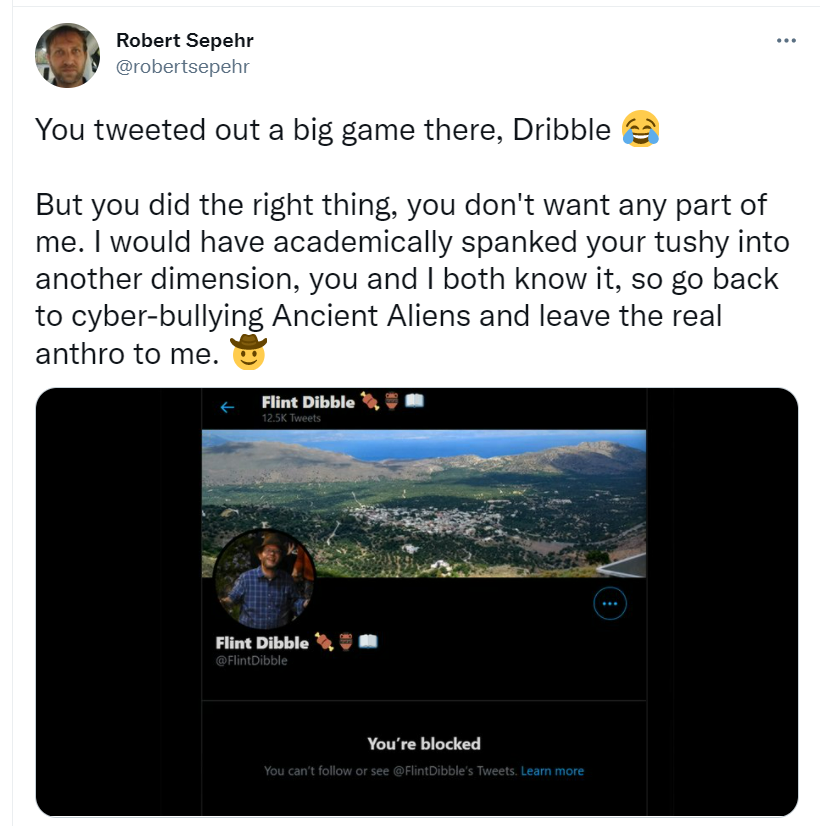



The Atlantis myth has a direct connection to Nazism. Nazi intellectuals promoted by Himmler believed the Atlantides were the ancestors of the Aryans. He sent out archaeological expeditions across the world to prove this
/52

/52


As you can see from the Tweets I saw yesterday, the racism component of the #Atlantis myth is alive and well
Even if this new TV show is presented in a different, less overtly racist manner, racist #Atlantis truthers will cheer
It's a gateway to Sepehr's popular YouTube
/53

Even if this new TV show is presented in a different, less overtly racist manner, racist #Atlantis truthers will cheer
It's a gateway to Sepehr's popular YouTube
/53


I don’t really see a way forward other than to keep telling my own stories about #archaeology and try to expose the ways that conspiracy theories work
They use real evidence, but ignore context. Sometimes this is intentional, sometimes accidental. But the results are no good
/54
They use real evidence, but ignore context. Sometimes this is intentional, sometimes accidental. But the results are no good
/54
I want to emphasize that being an expert does not mean you need to have a fancy PhD
@Historysmilo creates fantastic YouTube videos presenting real archaeology
@BradyKiesling has created topostext.org to compile ancient texts & places
They don’t have PhDs
/55
@Historysmilo creates fantastic YouTube videos presenting real archaeology
@BradyKiesling has created topostext.org to compile ancient texts & places
They don’t have PhDs
/55
But they both work with experts to try to understand the field of archaeology as we practice it
They don’t try to conform the evidence to a trendy story, instead they work to present real evidence and let it reveal the story of past people
/56
They don’t try to conform the evidence to a trendy story, instead they work to present real evidence and let it reveal the story of past people
/56
We have such cool archaeological evidence. It’s beautiful, compelling, and tells such amazing stories of struggles, passion, and perseverance of past people
If only people would pay attention.
/end
If only people would pay attention.
/end
For those that missed yesterday's thread, there are some interesting conversations and links in there:
https://twitter.com/FlintDibble/status/1392969142685286402
And if you want to read about how our archaeological and historical evidence can still be made relevant today, through historical storytelling, check out my thread on the plague of Athens:
https://twitter.com/FlintDibble/status/1242788506260377601
Thank yous:
@stelpavlou for sharing his unpublished paper and allowing me to share images from it
@StevenEllis74 for drone footage in tweet #1
Reconstruction of Atlantis in tweet #13 by Rocío Espín Piñar: artstation.com/artwork/8ong6
@stelpavlou for sharing his unpublished paper and allowing me to share images from it
@StevenEllis74 for drone footage in tweet #1
Reconstruction of Atlantis in tweet #13 by Rocío Espín Piñar: artstation.com/artwork/8ong6
All translations of Plato's Timaeus and Critias by Waterfield 2008. global.oup.com/ukhe/product/t…
Drone footage in tweet #20 from @KTzortzinis of @ASCSAthens
Images of material culture from Neolithic Athens from ascsa.net
Drone footage in tweet #20 from @KTzortzinis of @ASCSAthens
Images of material culture from Neolithic Athens from ascsa.net
Text in Tweet #24 from Hurwit 1999. The Athenian Acropolis
I highly encourage everyone to read Johansen 1998 "Truth, Lies, and History in Plato's Timaeus-Critias. It is cited by @stelpavlou but never rebutted
I highly encourage everyone to read Johansen 1998 "Truth, Lies, and History in Plato's Timaeus-Critias. It is cited by @stelpavlou but never rebutted
The quote in Tweet #32 is from Usher 2020. Plato's Pigs and Other Ruminations
I'm sure I'm forgetting a few other sources, I apologize. All errors are my own
I'm sure I'm forgetting a few other sources, I apologize. All errors are my own
oh, the part about Himmler, Nazis, and Atlantis came from this article: haaretz.com/jewish/holocau…
Would love a boost on this thread from archaeologists & classicists with large followings who prefer critical research to the misuse of our evidence
@wmarybeard @sentantiq @SarahEBond @profdanhicks @indyfromspace @DSAArchaeology @theAliceRoberts @DariusAryaDigs @pompei79 @Moudhy
@wmarybeard @sentantiq @SarahEBond @profdanhicks @indyfromspace @DSAArchaeology @theAliceRoberts @DariusAryaDigs @pompei79 @Moudhy
And this detail certainly highlights the overlap between more dangerous conspiracy theorists and those we consider less harmful
https://twitter.com/WatTylerRising/status/1393908133890826241?s=19
Some more examples of recent-ish misuse of Atlantis
https://twitter.com/KUHoopes/status/1394015556454559748?s=19
I don't usually like to engage in it for tat debate on Twitter, but Tony makes a good point here that I think should be addressed
https://twitter.com/TonyAngelo/status/1394049947301859328?s=19
First off, I hate arguing on Twitter, so I apologize for rarely acknowledging critical comments/questions. I won't change this policy, my threads are my threads and will be arranged how I like to present my thoughts and research
Second, I very much disagree w/ most of Tony's points. Much of the research he cites is out of date, & some of the individuals he labels as academics, I'd also strongly disagree on calling them such (tho maybe one used to be)
I'm not gonna name names & start a flame war on that
I'm not gonna name names & start a flame war on that
But the point made in this specific tweet is a good one. Kritias doesn't get everything wrong in his description of early Athens
He describes things that existed before his life: 1) the acropolis wall, 2) the Athena temple, 3) the klepsydra spring house
He describes things that existed before his life: 1) the acropolis wall, 2) the Athena temple, 3) the klepsydra spring house
https://twitter.com/TonyAngelo/status/1394049946194628608?s=19
So, Kritias has sketched out a partly correct and partly incorrect picture of early Athens. the problem is that all the things he mentions that are correct are all things that would have been visible in Plato's lifetime
1) the acropolis wall is a strange piece of evidence for Tony to bring up. Bc if the acropolis was as big as Kritias described then this wall can't be the wall we know of around the acropolis
So, either Kritias is describing a wall that doesn't exist. Or, he's describing the Bronze Age acropolis wall we know about. But this wall was visible during Plato's life as they constructs the Temple of Athena Nike and portions are still visible
Regardless, if it was that wall
Regardless, if it was that wall
2) the Athena temple was destroyed by the Persians. It's ruins were intentionally left visible afterwards and are still visible today
3) the Klepsydra spring is a natural spring and so was likely always used. It was still used in Plato's lifetime, as he said
3) the Klepsydra spring is a natural spring and so was likely always used. It was still used in Plato's lifetime, as he said

What this means is that the parts Plato got correct don't need to be due to some history he had access to. Instead his model was designed to seem plausible, and to do so used examples right in front of the eyes of everyone of the past
And ignore that I switched from Critias to Kritias 😂
As someone who works in Greece, I prefer the transliteration Kritias, but he's just canonically spelled Critias in philosophy texts that I used that spelling for the thread
It's all the same in Greek, them letter kappa
As someone who works in Greece, I prefer the transliteration Kritias, but he's just canonically spelled Critias in philosophy texts that I used that spelling for the thread
It's all the same in Greek, them letter kappa
• • •
Missing some Tweet in this thread? You can try to
force a refresh








